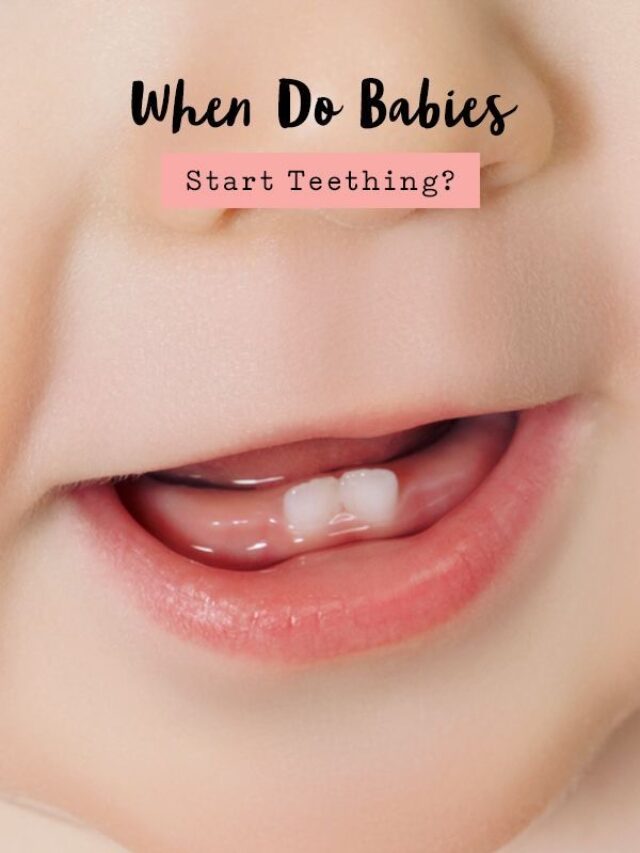Table of Contents

Introduction
The arrival of baby teeth is an important milestone in a child’s development, but it can also be a challenging and uncomfortable experience for both the child and their parents. Teething is a natural process in which primary teeth begin to emerge, but it often comes with various symptoms that can cause concern and confusion for parents. This article aims to provide a comprehensive understanding of teething, its common symptoms, debunk myths, and explore natural remedies to alleviate discomfort.
Teething Symptoms: Separating Fact from Fiction
Parents eagerly anticipate the emergence of their baby’s first teeth as a sign of normal growth and development. However, it can be accompanied by several symptoms that can cause distress for both infants and their caregivers. It is essential to distinguish between common symptoms and misconceptions associated with it.
Common Teething Symptoms:
- Irritation of Gums and Soft Tissues: One of the most prevalent teething symptoms is gum irritation. As the baby’s teeth push through the gums, it can lead to redness and swelling in the affected area.
- Irritability: It can make infants more irritable than usual. They may become fussy, restless, and difficult to soothe.
- Drooling: Increased drooling is a typical sign of teething. Babies may produce excessive saliva, leading to wet clothing and discomfort.
- Gnawing and Chewing: Infants may instinctively chew or gnaw on objects to relieve the pressure and discomfort caused by emerging teeth.
- Loss of Appetite: It can affect an infant’s appetite. They may be less interested in eating or drinking due to gum discomfort.
Debunking Teething Myths:
While it is known to cause specific symptoms, some common beliefs and myths about it should be clarified:
- Fever: Research has shown that it does not typically cause fevers. While a slight increase in temperature (about 0.2°F or 0.1°C) may occur during tooth eruption, it is not significant enough to be considered a fever.
- Diarrhea: It does not cause diarrhea. If a child experiences diarrhea during the teething process, it is likely coincidental and not directly related.
- Serious Medical Problems: It symptoms, such as gum irritation and drooling, are generally not indicative of serious medical issues. However, persistent high fevers, prolonged diarrhea, or severe refusal to eat or drink should be evaluated by a healthcare professional.

Understanding the Purpose of Teething
It is a natural physiological process in which primary teeth gradually move from their developmental position within the alveolar bone to break through the gum and emerge into the oral cavity. This process typically begins around 6 to 10 months of age and continues until the age of 25 to 33 months when the primary molars appear. While it is a normal part of a child’s development, its impact on overall health has been a subject of debate among healthcare professionals.
Research Findings on Teething Symptoms
A meta-analysis of ten studies conducted in eight countries sheds light on the common symptoms associated with it. These studies aimed to determine whether there are local or systemic signs and symptoms during the eruption of primary teeth in children aged 0 to 36 months. The key findings of these studies include:
- Common Symptoms: The studies confirmed the presence of common symptoms, including gum irritation, irritability, and drooling, during the emergence of primary teeth.
- Fever Not Typically Linked to Teething: Contrary to popular belief, the research found that fevers are not usually associated with it. Therefore, parents should not automatically attribute high fevers in infants to it and should seek medical care when necessary.
- Global Research: The studies involved data from various countries, including Australia, Brazil, Colombia, Finland, India, Israel, Senegal, and the United States, making the findings more comprehensive and applicable to diverse populations.
An Anxious Time for Parents
The period when a child is it can be a source of anxiety and stress for parents, especially if it is their first experience with a teething infant. Many parents may struggle to identify the signs of it and may feel uncertain about how to provide relief for their child’s discomfort.
Expert Insights: Paul Casamassimo, DDS, MS, a professor of pediatric dentistry at The Ohio State University College of Dentistry, emphasizes the importance of understanding that it is a normal aspect of early childhood development. He advises parents to be patient and attentive to their baby’s symptoms. Each child may respond differently to the eruption of primary teeth, so parents should observe their child’s behavior and employ simple remedies to provide relief.
Potential Complications to Monitor: While it’s discomfort is generally temporary, parents should remain vigilant for signs of more serious issues:
- High Fevers: Persistent high fevers that do not subside and are not associated with teething may indicate an underlying infection or illness.
- Diarrhea: If diarrhea persists during it, it is likely unrelated to the process and should be evaluated by a healthcare professional.
- Refusal to Eat or Drink: Prolonged refusal to eat or drink can lead to dehydration, which can occur rapidly in infants. Parents should ensure their child remains adequately hydrated.

The Importance of Natural Oral Care
Oral hygiene is essential for maintaining the health of a child’s emerging teeth. Poor oral hygiene practices can exacerbate teething discomfort and lead to gum inflammation. Bruno Sharp, CD, DDS, MS, a fourth-generation dentist in Florida, emphasizes the significance of parental action in promoting good oral health for children.
Key Points from Dr. Bruno Sharp:
- Good home care, including regular brushing and flossing, is crucial to prevent additional pain and gum inflammation during teething.
- Some children may develop dental caries (cavities) due to inadequate oral hygiene practices. Rampant caries can result from bad oral hygiene habits.
- Parents should prioritize using natural oral care products for their children to avoid harmful ingredients found in some commercial dental products.

Natural Solutions for Teething Discomfort
Parents can employ natural remedies to help alleviate the discomfort associated with teething. These remedies aim to soothe the baby’s gums and provide relief from gum irritation and other symptoms.
Effective Natural Remedies:
- Cold Teething Rings: Chilled teething rings provide gentle pressure on the gums, reducing discomfort. However, avoid freezing teething rings, as they can become too hard and pose a choking hazard.
- Cold Washcloths: Wet a clean washcloth and place it in the freezer for a short time. The cold cloth can offer relief when the baby chews or gnaws on it.
- Teething Toys: Choose teething toys made from safe, non-toxic materials. These toys provide a safe surface for the baby to chew on.
- Gentle Gum Massage: Gently massage the baby’s gums with a clean finger or a specialized gum-rubbing finger pad to soothe irritation.
- Natural Teething Products: Look for natural teething products that do not contain harmful ingredients. These products can provide relief without exposing the baby to potentially harmful substances.
Conclusion
It is a natural and expected phase of a child’s development, but it can be a challenging time for both infants and parents. Understanding the common symptoms of it and dispelling myths related to symptoms, such as fever and diarrhea, is crucial for providing proper care. Parents should be attentive to their child’s needs, employ safe and natural remedies to alleviate discomfort, and maintain good oral hygiene practices to ensure their child’s overall health and well-being during the process. By following these guidelines and seeking medical advice when necessary, parents can help their infants navigate the teething journey with comfort and care.
Share this content:









